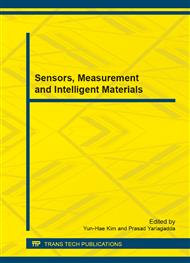[1]
G. Sandström, S. Gustavsson, S. Lundberg, U. Keijer, S. Junestrand: Long-term viability of smart home systems-business modelling and conceptual requirements on technology, in: S. Andy (Ed. ), Proc. Home-Oriented Informatics and Telematics (HOIT) 2005, Springer, 2005, p.71.
DOI: 10.1007/11402985_6
Google Scholar
[2]
C. Y Chen, C. H Chiu, S. M Yuan: A MOM-based home automation platform, LectureNotes in Computer Science, Vol. 4413, Springer Berlin, Heidelberg, 2007, p.373–384.
Google Scholar
[3]
Mike P. Papazoglou, Willem-Jan van den Heuvel: Service-oriented architectures: approaches, technologies and research issues, VLDB Journal 16 (3) (2007), p.389–415.
DOI: 10.1007/s00778-007-0044-3
Google Scholar
[4]
X Li, W. J Zhang: The design and implementation of home network system using OSGi compliant middleware, Consumer Electronics, IEEE Transactions 50 (2) (May 2004) , p.528–534.
DOI: 10.1109/tce.2004.1309419
Google Scholar
[5]
T.R. Gruber: Toward principles for the design of ontologies used for knowledge sharing, International Journal of Human–Computer Studies 43 (5–6) (1995), p.907–928.
DOI: 10.1006/ijhc.1995.1081
Google Scholar
[6]
N. Guarino: Formal ontology and information systems, in: FOIS'98: Proceedings of the First International Conference on Formal Ontology in Information Systems, IOS Press, Trento, Italy, 1998, p.3–15.
Google Scholar
[7]
L. M Chen, C Nugent, M Mulvenna, D Finlay, X Hong: Semantic smart homes: towards knowledge rich assisted living environments, Intelligent Patient Management 189 (2009) , p.279–296.
DOI: 10.1007/978-3-642-00179-6_17
Google Scholar
[8]
I Roussaki, M Strimpakou, N Kalatzis, M Anagnostou, C Pils: Hybrid context modeling: A location-based scheme using ontologies, in: PERCOMW'06: Proceedings of the 4th Annual IEEE International Conference on Pervasive Computing and Communications Workshops, IEEE Computer Society, Washington, DC, USA, 2006, p.2.
DOI: 10.1109/percomw.2006.65
Google Scholar
[9]
M Perttunen, J Riekki: Context Representation and Reasoning in Pervasive Computing: a Review, International Journal of Multimedia and Ubiquitous Engineering Vol. 4, No. 4, October, 2009, pp.1-28.
Google Scholar
[10]
N Roy, T Gub, S. K Dasc: Supporting pervasive computing applications with active context fusion and semantic context delivery, Pervasive and Mobile Computing 6 (2010), pp.21-42.
DOI: 10.1016/j.pmcj.2009.10.002
Google Scholar


